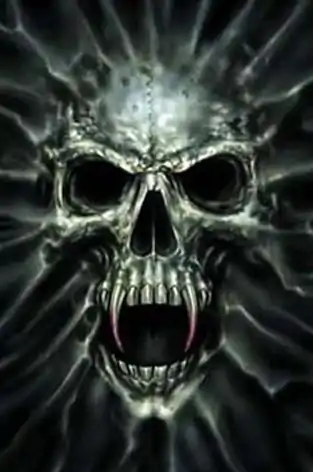Nalfien (4e Deity)
Nalfien
Evil
Domains: Undeath, Poison
Warpriest Domain: Death
Nalfien was born a mortal, raised among a death cult, and trained as a necromancer. After his death, his soul went to the Abyss because he did not worship a deity and thought himself above them. He began his afterlife as a larva. He quickly became a mane, then over the next thousand years he progressed through the ranks of demonkind to become a powerful Glabrezu Necromancer. He served the Demon Prince Orcus for more then a century, when fate intervened and Orcus achieved godhood for a short time. Nalfien was quickly forgotten in Orcus' quest for more power. So Nalfien conspired with agents of Demongorgon and Graz'zt to eliminate some of Orcus' more trusted servants. The conspiracy worked and Orcus had his divinity stripped from him. Nalfien, however, was prepared and secretly harnessed some of Orcus' fleeting divine spark. Orcus caught Nalfien in his attempt and sought to strip Nalfien of his Glabrezu status. The reason is unknown, but instead of being demoted in demonic rank Nalfien became an abomination, part Glabrezu and Lich. Nalfien fled the Abyss and Orcus' wrath. Nalfien sought out a distant world and perverted small cults of Orcus so that they would worship him instead. Then, a century later, Nalfien ascended as a demi-god in service to a death god. Nalfien helped the death god transform the world from one of the living worlds to a dead world. Then, the meddling mortal woman Anesthia struck down the death god and Nalfien was forced to flee that world. He took his few worshipers and followed the mortal woman to Sigil and then on to Stormforge. When he discovered the mortal woman had ascended into godhood and assumed the place of a death god herself, Nalfien sought her out and offered his services in rotting away the mortals of this world. Anesthia rebuffed him and so he vowed to humble the wench. He looked about the world and discovered that necromancy was almost unknown to the people. He walked the world spreading his knowledge of dark magic. When Ashmedai, God of Tyranny and Tatenal, God of Corruption confronted him about his presence on their world, Nalfien bowed to before their power and pledged himself to their purposes. Nalfien bides his time until he can fully accomplish his task of creating another undead world.
Unlike deities of other worlds, Nalfien receives power from his sentient undead worshipers as well as his living ones so he encourages his faithful to seek undeath. He is worshipped by those dying, undead, and necromancers worship Nalfien. Special rites and rituals are held on the nights of the new moon and the last day of the year for his worshipers. Services feature weird humming and droning chants in near darkness lit only by vile green necromantic light and the faithful are expected to either create undead or bring a corpse to a cleric so that they may create the undead. His commandments are:
- Seek the immortality through undeath
- Slaughter and honor my by raising them as undead
- Raise the faithful as free-willed undead, raise our enemies as undead servants
- Destroy the followers of Anesthia
- Spread plagues and famine among the living to hasten their demise and strengthen our armies
Nalfien abides in the Shadowfell. There are many small cults and several small temples to Nalfien. Typically the temples are hidden from view or reinforced for protection from good beings, like paladins and deathmaidens. All sentient undead are provided sanctuary within the walls of a temple or cult of Nalfien, unless the creature fails to pay proper respect or would bring unwanted attention to the faithful. The clerics of Nalfien say their prayers at midnight and always perform a simple ritual to create an undead creature. Adventuring clerics will often turn small mammals, reptiles, birds, or insects into skeletons or zombies so as to perform the necessary ritual ceremony, but not cause suspicion.
Cleric Training
Clerics of Nalfien are very open. They enjoy torturing others and spreading disease and blight. They travel to lands to discover new diseases or to spread them. Some being undead themselves can talk to Nalfien and ask him for guidance
Quests
- Destroying followers of Anesthia.
- Protecting a group of gravediggers as they steal the corpse from a town graveyard.
- Searching for ancient rituals of crafting undead.
- Travel deep within a mysterious tomb to destroy a traitorous lich.
Heralds and Allies
Nalfien has reluctantly pledged himself to Ashmedai and Tatenal making him a member of the Pantheon of Evil, however he holds no true loyalty to any of his so called allies since none are worthy. Nalfien's herald is called the Prophet of Nalfien. The current Prophet of Nalfien is the seductive vampiric Shadar-Kai, Vai'lanthe Kar-Shau.
Back to Main Page → 4e Homebrew → Deities

